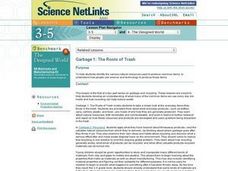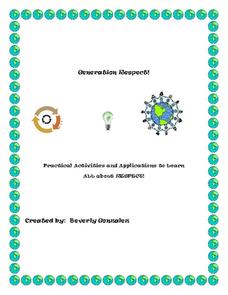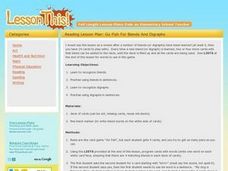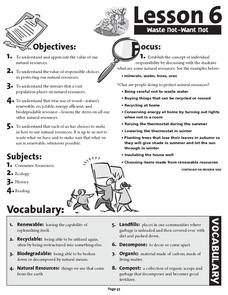Curated OER
The Trash We Pass
Where does our garbage go? What is the difference between a recyclable and non-recyclable item? Pose these important, but often overlooked, questions to your class and invite them to consider the lasting and damaging effects of the...
Curated OER
"Snapshot" Exercises & Sensory Detail Word Bank
Read a sample of creative descriptive writing to your science class. Discuss how writing can be used to record and communicate observations that scientists make. Reading selections and thought-provoking questions are suggested. Also...
Curated OER
A Lot Of Garbage
Learners collect their own garbage. In this recycling lesson, students keep their own garbage for a day in their own personal garbage bag and then consider methods to reduce wastefulness.
Curated OER
Alphabetizing
Typing is an essential skill in our day and age! Introduce your second graders to computer typing by teaching them the correct placement of the fingers on a keyboard. Then, they complete an assignment using the word processor.
Curated OER
Introduce Vocabulary: Amigo
Pupils determine the meaning of tier-two vocabulary words. They explore vocabulary while reading Amigo. As they read, they record their words in a word journal or on a discovery chart. The words bold, content, pleasant, seek, wise, and...
Curated OER
Introduce Vocabulary: A Picture Book of Abe Lincoln (Adler)
The story of Abe Lincoln serves as the backdrop to this vocabulary-in-context activity as you read David Adler's A Picture Book of Abraham Lincoln. Scholars learn these politically themed words before listening to you read the story...
Curated OER
Introduce Vocabulary: Amigo (Baylor)
Amigo by Byrd Baylor gives learners a chance to practice with unknown words and context clues. Choose several vocabulary words to focus on as you read the picture book, or use the ones provided here (the book is in English despite the...
Curated OER
Trash Talkin
Young scholars investigate recycling at several scales, including local, state, national and global. They become aware of recycling, re-use, reduce efforts and policies. Students read the article Where Does Your Garbage Go. They look up...
Curated OER
After the Garbage Can: Where Does Our Trash Go?
Young scholars explore how waste disposal has changed over time and what the current issues are. In this disposal activity students collect data and create graphs.
Curated OER
GARBAGE 1: THE ROOTS OF TRASH
Young scholars identify the various natural resources used to produce common items; to explain how people use science and technology to produce those items.
Curated OER
Waste Management
Students explore the topic of waste management. They define key vocabulary words, take a pre-quiz, complete a questionnaire, evaluate their own waste reduction habits, and write a short summary.
Curated OER
Trash to Treasures
Middle schoolers analyze the artwork of Jaune Quick-To-See Smith. In this service project analysis, students create interpretations of their service experience. Middle schoolers reflect in words utilizing the "I Am" Model. The student...
Spreading Gratitude Rocks
Generation of Respect
R.E.S.P.E.C.T. Learners find out what it means to them. Scholars write sentences, do a word sort, and list what makes them grateful. Additionally, pupils learn how to be more respectful by completing worksheets that would make Aretha...
Curated OER
Recycling and Composting
Students set up composting sites that allow food scraps and paper to be recycled by nature. They are introduced to one aspect of recycling; composting. Students see how God recycles as the worms change garbage into something that brings...
Chymist
Landfills and Recycling
Examine the nature of landfills through experimentation. Scholars build miniature landfills and monitor changes over a six-week period. Observations allow individuals to draw conclusions about the different types of trash and their...
Curated OER
"Bursting" Stereotypes
Students comprehend the meaning of the word steretype, work in groups to come up with stereotype statements, discuss whether the statements are fair, and write what they learned from the activity. Balloons are used as a conduit in this...
Curated OER
Go Fish For Blends and Digraphs
Youngsters practice using blends and digraphs. In this early reading lesson, students play a game of "Go Fish" using words that contain a blend or digraph. This allows them to practice recognizing the word and using it in a sentence.
Wilderness Classroom
Pollution
Educate scholars on pollution—air, water, and land—with a series of lessons that begin with a thorough explanation of each type. Learners then take part in three activities to reinforce the importance of reducing pollution. They...
Alabama Learning Exchange
WATER You Doing to Help?
Auntie Litter is here to educate young scholars about water pollution and environmental stewardship! Although the 15-minute video clip is cheesy, it's an engaging look at the water cycle and conservation. Learners start by illustrating...
Curated OER
Reduce, Reuse, Recycle
Students understand the process of recycling. They investigate how it improves the environment. They read the story "Don't Pollute" by Stan and Jan Berenstein. They analyze trash and sort it into bins.
Curated OER
Our Playground!
First graders observe and explore the playground's environment by walking around the playground, followed by a group discussion of what they observed. They then divide into groups and participate in centers, their brought back together...
Southern Nevada Regional Professional Development Program
“Double Double Speak Speak”
Bilateral suborbital hematoma? Call an audible? 404? Have fun with “the twittering or warbling of birds,” or as 14th century French speakers would say, have fun with “jargon.” Groups match specialized jargon with plain speech, decode...
EngageNY
Grade 9 ELA Module 4, Unit 1, Lesson 18
As first-year students continue to investigate how sugar changed the world, the focus shifts to a consideration of why people with limited job options take on dangerous or subjugating work. Class members read an opinion piece by Nicholas...
Forest Foundation
Waste Not - Want Not
Recycling is the focus in the sixth of a nine-activity series devoted to forest ecosystems. Class members read an article about the responsible use of natural resources and ways to reduce land fill.

























